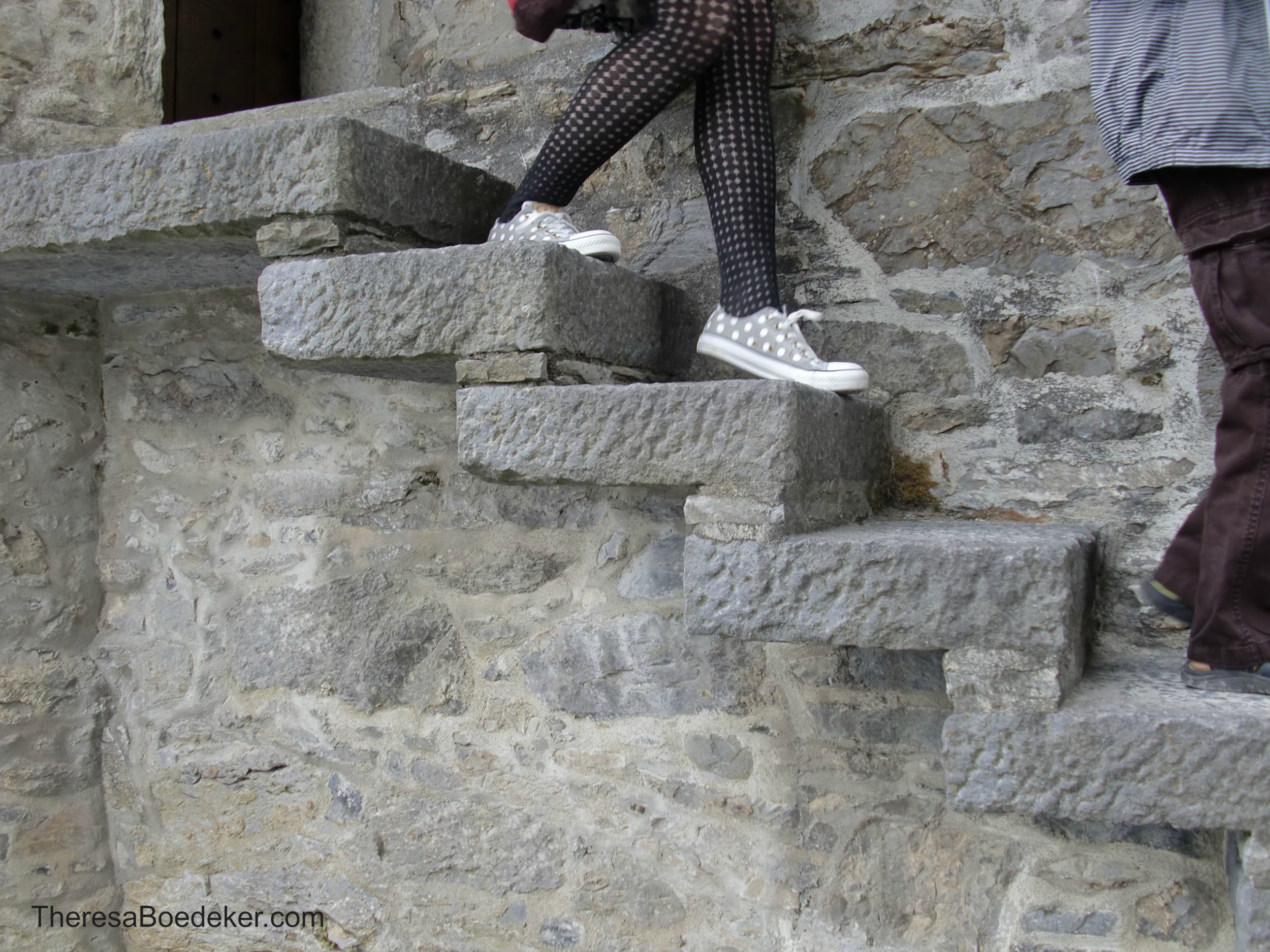

 Many of us are afraid of making mistakes because we associate making mistakes with something bad. Something to be avoided at all costs.
Many of us are afraid of making mistakes because we associate making mistakes with something bad. Something to be avoided at all costs.
I developed this attitude as a child. I lived in fear of doing or saying the wrong thing. Of making a mistake and people not liking me. Of embarrassing myself. Of my pride being hurt. And worst of all, of not being loved.
 It took years to realize that I was not my mistakes. That my worth was not dependent on what I did or did not do. It took making lots of mistakes to see that making mistakes is a natural part of learning, living, and being human. I had to learn to quit beating myself up and quit equating mistakes with sin. Over time, I began to start seeing mistakes as a learning opportunity.
It took years to realize that I was not my mistakes. That my worth was not dependent on what I did or did not do. It took making lots of mistakes to see that making mistakes is a natural part of learning, living, and being human. I had to learn to quit beating myself up and quit equating mistakes with sin. Over time, I began to start seeing mistakes as a learning opportunity.
Remember it is not the mistakes that matter, it is what we do after our mistakes that is important.
As a parent, I want my children to have a better life than I had. I also want my children to not be afraid of making mistakes. I want them to be able to stand up and yell, “Yay for mistakes.”
So how can we give our children the freedom to make mistakes, teach our children that it is alright to make mistakes, and show them how to learn from their mistakes?
First, we need to start being role models We need to quit beating ourselves up for our own mistakes, and instead learn from them. Laugh at them.
When we talk about our mistakes and what we learned from them, we are showing our children how to approach their own mistakes. When we laugh at our mistakes and not let them ruin our day, we are communicating that mistakes don’t have a lot of power over us and that it is alright to make mistakes.
 Here are some things I am trying to teach my children about making mistakes. How to learn from mistakes:
Here are some things I am trying to teach my children about making mistakes. How to learn from mistakes:
Making mistakes is a normal part of life and learning.
A toddler can’t learn to walk without falling a lot of times. An artist will have to draw hundreds of hands before they master drawing them. No one can learn to play the piano without hitting a plethora of bad notes. The first attempt at cleaning the toilet will not be the best. A first interview is often like a bad movie and lingers for a while.
When our children start beating themselves up after a mistake, remind them that they need to make a lot of mistakes to learn something. Remind them that mistakes are a big part of learning.
Sometimes I just shout, “Yay for mistakes!” Yes, it seems silly, but the point is to break the mood. Maybe we start giggling. The point is to remind them that mistakes don’t have to be these serious things we need to be afraid of. Mistake are evidence of trying.
It must be sinking in because sometimes when I make a mistake, my children will remind me that it is all part of learning and it is alright. “You just pulled a Theresa,” they say.
 Is it a mistake or lack of knowledge?
Is it a mistake or lack of knowledge?
Sometimes we get more upset when we make a mistake doing something we know we are good at than when we make a mistake at something we are not good at.
I have a child that is great at math, but can get frustrated when he gets a problem wrong. I like to say, “Yay! A learning opportunity! Now let’s put our detective hats on and discover where the mistake is.”
We both look at the problem and either he will find it or I will. Often it is a silly mistake, a step inverted or forgotten, and I will say, “Oh, look at this silly mistake. You inverted the steps. Silly you.” On a good day, he will see it and we both laugh. “You know how to do this problem, you just made a silly mistake,” I say.
He corrects his problem and off we go.
Sometimes he makes the mistake because he doesn’t know how to do the problem. Then I say, “Great! An opportunity to learn. How exciting!” And then I figure out what he doesn’t understand and reteach him.
Now this may seem silly, but it works in our house and communicates to him that mistakes are alright in school work. In fact, I will remind him that when we make mistakes and correct them, we have less chance of making the mistake in the future.
How many of us got a word wrong in a spelling bee and when we heard the correct spelling we kicked ourselves in the brain? But the thing is, we have never forgotten how to spell that word again. Realizing our mistakes and correcting our mistakes cements that learning into our minds.
That is what life is about – learning. That is what school is about – learning. If you are learning, then you are on the right track and doing what you are supposed to be doing. No matter how many tries it takes. No matter how long it takes.
 Ask what they can learn from their mistake.
Ask what they can learn from their mistake.
If your child comes home disappointed because they received a C on the last science test, now is the time to ask a question or two, not jump on them for their low grade. Asking, “Why do you think you got a C?” gets the child thinking about what they can learn from their mistake and then do differently. It also gives them power to change the future.
Maybe your child doesn’t know why they got a D. Throw out some questions. Did they think they were prepared? Were they especially nervous? Had they read the chapter? What did the other students get?
When your child identifies the reason and takes responsibility, this empowers them to focus on the future. Awareness and learning start to occur here. We can’t change the past, only the future. This is why lecturing, guilting, and shaming don’t work.
If your child confesses they didn’t study, then say, “If you want a better grade next time you know that studying will help. Let me know if I can help you study for your next test.”
 Praise them for trying and doing their best. [Not for being perfect.]
Praise them for trying and doing their best. [Not for being perfect.]
No one is perfect or can perform at a high level forever. Don’t just praise your child for getting A’s or winning an award. Instead, praise them for doing their best. For trying. For their perseverance. For their good attitude. For not losing their temper when it gets hard.
When my children feel bad about something, I ask, “Did you try? Did you do your best? Then quit beating yourself up. Your dad and I only ask that you try and do your best.”
If they didn’t do their best, then remind him there is a next time and ask what they can do to improve next time. The whole goal is to get them to learn from the experience.
 Focus on what happens after the experience more than the experience itself.
Focus on what happens after the experience more than the experience itself.
Our children can get disappointed when they mess up. Remind them of what is most important.
One morning my son was lamenting about a back and forth exchange with his dad. I reminded him that it was more important what he did now, than their earlier word tussle. If he could admit his part, do the right thing now, and learn what to do and not do before the next time he and his dad went at it, then it will have been a valuable experience.
In order to change, we need to first be self aware and identify the problem. Then we can focus on steps to solve the problem. We as parents can help our children in this way by guiding the conversation by asking questions. Not lecturing or us doing the talking, but listening and asking questions.
 Grace and understanding go a long way.
Grace and understanding go a long way.
Teach your children to forgive themselves and spread grace on their wounds. Remind them that everyone makes mistakes. Everyone.
If they are beating themselves up, ask them what advice they would give their best friend if they did what they did. This may show them that they are holding themselves to a higher standard than they are their friends.
 Try different methods.
Try different methods.
Say your child is making mistakes in forgetting to do their chores. Brainstorm with them ideas to help them remember. Pictures on their bathroom mirror. A chore chart on the fridge. It takes more time on my part, but if I make a list of tasks, the success rate jumps much higher at my house than when I just bark out tasks.
Asking their opinion about what would help them succeed, gives your child power and helps them learn about themselves. Are they a list maker? Does setting a timer and playing rousing music help cleaning go quicker? Perhaps listening to a book on tape helps them not get sidetracked in a chore.
Figure out how their brain is wired and discover their learning style.
 Communicate unconditional love.
Communicate unconditional love.
Remind them again and again that their mistakes do not determine their worth. Their day. Or even how much you love them.
Communicating to our children that mistakes are just a part of life and another way to learn is an ongoing process, but think of the rewards.
Our children may not be as afraid of making a mistake as most of us are.

Join the Discussion: How do you help your children deal with their mistakes?
Turn Your Children’s Mistakes into Learning Opportunities
Learn 10 steps to help you
Yes! I want the FREE RESOURCE to help guide me in creating
independent children that learn from their mistakes.
Articles in this series on mistakes:
Part 1 of Yay for Mistakes! What do You Do?
Part 2 of Yay for Mistakes! How to Respond
Part 3 of Yay for Mistakes! Responding to Our Children’s Mistakes
Part 4 of Yay for Mistakes! How to Let Our Children Fail and Make Mistakes
Part 5 of Yay for Mistakes! Quieting a Myth of Mistakes
Part 6 of Yay for Mistakes! Mistaking Our Worth
Part 7 of Yay for Mistakes! Mistaking Paradise
Part 8 of Yay for Mistakes! Some Mistakes are Really Blessings in Disguise
Part 9 of Yay for Mistakes! Dealing with Real Big Mistakes
Part 10 of Yay for Mistakes! Letting Go to Make Mistakes
Part 11 of Yay for Mistakes! Dealing with Critical Words From Mistakes
Accompanying this series, Life as it Comes, a story podcast, takes a humorous look at making mistakes in episode 31, “Have You Pulled a Theresa?”
For another voice on the benefits of mistakes read The Value of Failure at (in)courage
Linking up at Jennifer Dukes Lee (#tellhisstory); and Holley Gerth (#coffeeforyourheart)
More encouragement:
- How Knowing Your Husband Can Impact Him for Good - March 24, 2022
- How to Stop Focusing on What’s Wrong with You - March 9, 2022
- Is God Really Good All the Time? - February 24, 2022
I wish with all my heart I had been taught this growing up. I would be healthier and happier if I had. I know a great deal about the neglectful and critical parenting style. Keep up spreading the word on this subject. This is the subject I would most like to see this writer write a book on. I think she could sell thousands.
I heartily agree, Colleen. I wish I had been taught this growing up too, but I love that it is never to late to start looking at mistakes differently and turn off the ‘neglectful and critical parenting’ voice in our heads (or that is directed at our children). Thanks for the vote of confidence regarding a book. I do think this is an important topic that could help thousands.
There’s so much good stuff here, Theresa! I love that your kids are free to say, “You just pulled a Theresa.” That shows them it’s OK not to take everything so seriously! At my house, we call those silly homework mistakes “boneheads.” Those are the best kind because they are easy to fix! I have a daughter who is gifted in English and word-oriented subjects but has to work harder in math. I frequently tell her, “You are not your math grade.” So glad to be next door to you this week at #TellHIsStory.
Lois, thanks for being my neighbor. Whether you call them a ‘bonehead’ or a ‘Theresa’ they never define our worth. And yay for that!
I love, love, love this, Theresa! “Yay! For mistakes!” It’s to so true that we need to celebrate our mistakes and let our children know that it’s more than okay to make them, because we learn from them. I do wish I had read this years ago when I was a young mom, but am grateful that you’re getting the message out to others who are in the thick of parenting, my friend!
Thanks for your encouraging words. Blessings.
By the way, you need to get a social media plugin, so that we can easily pin or tweet your stuff, Theresa!
Thanks for the suggestion. Maybe they need to be more obvious. I currently have black and white ones at the end of each post.
Mistakes can be very helpful learning curves that end up shaping us for destiny, that is, if we look at them from the perspectives you have shared here. And I totally agree with you on communicating unconditional love to our children even when they make mistakes.
Do have a super blessed day Theresa!
Love
So true Ugochi! Mistakes can definitely shape our destiny, and for the best. Great wisdom for us to keep in mind when we feel stressed about our mistakes. A lovely day to you too!
Wow thanks. Nice post! Very true.
Thanks for stopping by, Mary.
Thanks for this post with the lovely pics. Also the wise words and encouragement.
Kathleen
Blogger’s Pit Stop
My pleasure. Thanks for stopping by.